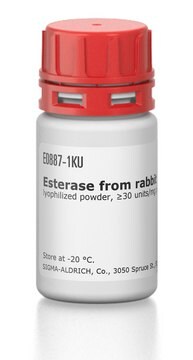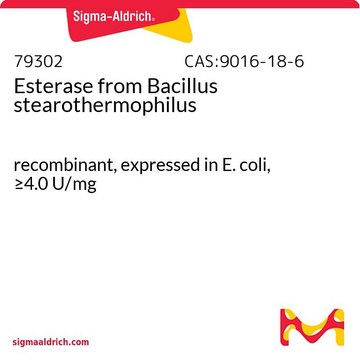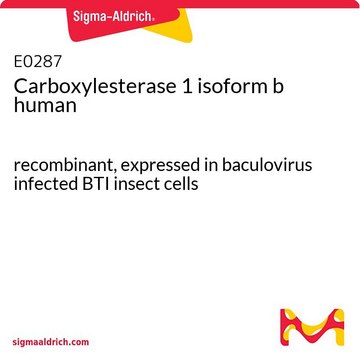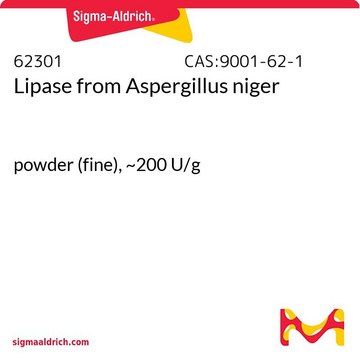E3019
Esterase from porcine liver
lyophilized powder, ≥15 units/mg solid
Sinônimo(s):
Carboxyl esterase, Carboxylic-ester hydrolase, PLE
Faça loginpara ver os preços organizacionais e de contrato
About This Item
Produtos recomendados
Formulário
lyophilized powder
atividade específica
≥15 units/mg solid
peso molecular
168 kDa
aplicação(ões)
diagnostic assay manufacturing
temperatura de armazenamento
−20°C
Procurando produtos similares? Visita Guia de comparação de produtos
Aplicação
Esterase from porcine liver has been used in a study to assess the effect of 5-aminolaevulinic acid peptide prodrugs on photosensitization for photodynamic therapy. Esterase from porcine liver has also been used in a study to investigate how site-specific atherogenic gene expression correlates with subsequent variable lesion development in coronary and peripheral vasculature.
Porcine liver esterase is used to catalyze the hydrolysis of pentaacetyl catechin and epicatechin for use in pharmaceutical and industrial applications.
Pig liver esterase is commonly used for kinetic resolutions and assymetric synthesis in organic chemistry.
Pig liver esterase is commonly used for kinetic resolutions and assymetric synthesis in organic chemistry.
The enzyme from Sigma has been immobilised in hollow fibre ultrafiltration membrane and used for the asymmetric hydrolysis of a meso-diester. Esterase from Sigma has been used to investigate its effect on the release of methacrylic acid (MAA) and 2-hydroxyethyl methacrylate (HEMA) from adhesives formulated under conditions simulating wet bonding. It has been used to examine the ability of carboxylesterase activity to remove permethrin- and bifenthrin-associated toxicity to Ceriodaphnia dubia and Hyalella azteca in a variety of matrices.
Ações bioquímicas/fisiológicas
Esterase acts on water-soluble carboxyl esters containing short chain fatty acids. Its functionality is attributed to the catalytic triad of Ser, His and Asp/Glu.
Pig liver esterase catalyzes enantioselective conversion of an ester to a carboxylic acid. The molecular weight is found to be 168 kDa. It is a serine enzyme with two active sites on each molecule, which dissociates into active half-molecules in the presence of dilute acid or concentrated salts.
Definição da unidade
One unit will hydrolyze 1.0 μmole of ethyl butyrate to butyric acid and ethanol per min at pH 8.0 at 25 °C.
Palavra indicadora
Danger
Frases de perigo
Declarações de precaução
Classificações de perigo
Resp. Sens. 1
Código de classe de armazenamento
11 - Combustible Solids
Classe de risco de água (WGK)
WGK 1
Ponto de fulgor (°F)
Not applicable
Ponto de fulgor (°C)
Not applicable
Equipamento de proteção individual
Eyeshields, Gloves, type N95 (US)
Escolha uma das versões mais recentes:
Já possui este produto?
Encontre a documentação dos produtos que você adquiriu recentemente na biblioteca de documentos.
Asymmetric hydrolysis of a meso-diester using pig liver esterase immobilised in hollow fibre ultrafiltration membrane.
Sousa HA, et al.
Tetrahedron Asymmetry, 11(4), 929-934 (2000)
Craig E Wheelock et al.
Environmental toxicology and chemistry, 25(4), 973-984 (2006-04-25)
Increases in the use and application of pyrethroid insecticides have resulted in concern regarding potential effects on aquatic ecosystems. Methods for the detection of pyrethroids in receiving waters are required to monitor environmental levels of these insecticides. One method employed
Kazuhito Watanabe et al.
Biological & pharmaceutical bulletin, 28(9), 1743-1747 (2005-09-06)
The properties of ES46.5K, an esterase from mouse hepatic microsomes, were compared with those of carboxylesterases from rabbit and porcine liver. The inhibitory profile with a serine hydrolase inhibitor (bis-p-nitrophenylphosphate) and detergents (sodium dodecylsulfate, Emulgen 911) was different between ES46.5K
Elisabet L Kostoryz et al.
Journal of biomedical materials research. Part B, Applied biomaterials, 88(2), 394-401 (2008-04-09)
Dentin adhesives may undergo phase separation when bonding to wet demineralized dentin. We hypothesized that adhesives exhibiting phase separation will experience enhanced biodegradation of methacrylate ester groups. The objective of this project was to study the effect of enzyme-exposure on
Enzyme-responsive snap-top covered silica nanocontainers.
Kaushik Patel et al.
Journal of the American Chemical Society, 130(8), 2382-2383 (2008-02-01)
Protocolos
Enzymatic Assay of Esterase
Nossa equipe de cientistas tem experiência em todas as áreas de pesquisa, incluindo Life Sciences, ciência de materiais, síntese química, cromatografia, química analítica e muitas outras.
Entre em contato com a assistência técnica









